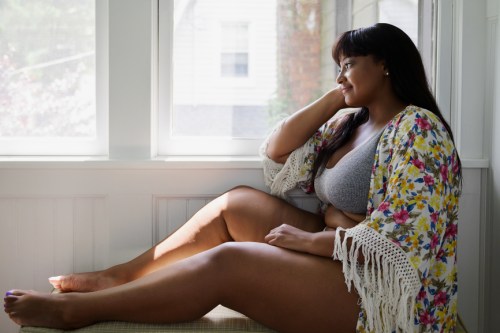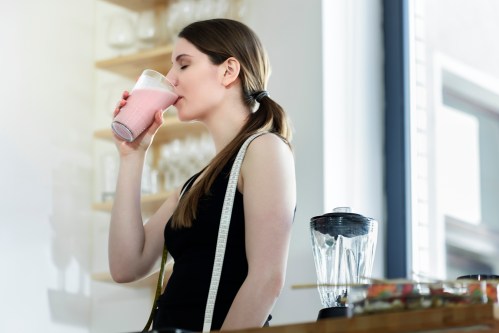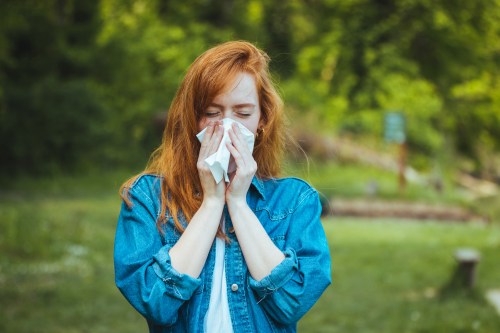Our editors independently select these products. Making a purchase through our links may earn Well+Good a commission
The rallying cry of the body-positivity and self-acceptance movement is bracingly simple: Just accept and love every part of yourself, and you’ll instantly be free from the restrictive norms imposed by society. Sound too good to be true? That’s because it most definitely is, according to Black queer femme activist, writer, speaker, and sexuality educator Ericka Hart, MEd. Unpack the body-positivity movement, and you’ll find that its goal is paradoxically as limiting and damaging as the fatphobic society it’s purportedly fighting against. In fact, the problem with body positivity, conceptually, stems from its source—which is not the same as the people toward whom the movement is targeted. And that ultimately renders the whole movement itself BS, according to Hart.
Experts in This Article
Ericka Hart, M.Ed., is a Black queer femme activist, writer, speaker, and sexuality educator.
“The current body-positivity movement represents a white-washing of a fat-activist space that was started by Black and non-Black [people of color],” said Hart in a recent virtual Well+Good TALKS panel celebrating the launch of activist and author Jessamyn Stanley’s new book Yoke: My Yoga of Self-Acceptance. “That is, saying something like, ‘You need to just love yourself,’ and thinking that that, somehow, is going to pay your bills and get you jobs and put food on your table, which is just not the reality.”
The very setup of the body-positivity movement essentially puts the onus of loving your body on you, the individual, said Hart during the TALKS panel—and that’s a problem. “You’re just supposed to decide to love yourself rather than contest with the institutions and the systems that have us constantly hating ourselves.”
“You’re just supposed to decide to love yourself rather than contest with the institutions and the systems that have us constantly hating ourselves.” —Ericka Hart
What are those institutions and systems? For just a few examples, in many health, medical, and wellness spaces, practitioners still exercise preference for thin bodies (even while Stanley herself stands as proof that every body can thrive in such a fatphobic space as yoga)—whether in the case of doctors who turn to weight loss as a panacea or fitness instructors who propose a particular type of body or weight-loss metric as the end goal of working out.
And even as someone deeply aware of these systems, Hart still regularly contends with internalized fatphobic thoughts, whether at home looking in a mirror, or while shopping—which goes to show how deeply these kinds of thoughts are ingrained.
“At that point, I have to turn to and rely on my community to remind me that this is just fatphobia working on me,” they say. “It’s not a reality that there’s something wrong with my body, or that there’s a body that I need to aspire to, and there’s also no mood that I need to aspire to, either—as in, I don’t need to love my body. It’s really okay if I sit with the emotions of not liking my body, and feel what comes up for me with that.”
This idea resonates in particular for Hart, not only as a sexuality educator but as a breast-cancer survivor who had a double mastectomy—a fact that initially shed light on their work when they bared their mastectomy scars while attending the Afropunk music festival topless in 2016. In a way, Hart says it’s an even larger ask to “love every part of herself,” as the body positivity movement prescribes, “when I’m still mourning a body that I once had.”
As a former regular practitioner of yoga, who was faced with the same limitations as many others in her space—Why doesn’t my body look like hers in a handstand? Why can’t I afford the latest leggings?—Hart was also impacted post-diagnosis by restrictions relating to their mastectomy. “It was really hard to use my arms for a while after the surgery, and now, seven years in remission, it’s still hard for me to go back to yoga because it feels really emotional. It’s challenging to process how sad I am that I don’t sit on a mat or that I don’t get to use my body in the same way.” And there’s no realistic self-acceptance solution to processing such a traumatic event that comes along with, ‘Well, I just need to love my body,’ Hart said in the TALK.
But even if you haven’t experienced this kind of physical or medical trauma and change, Hart noted that we all do experience change in some way. And not allowing space for adjustments with time is another key part of what’s wrong with the body positivity movement.
“We’re told that our bodies are supposed to look like we’re 15 years old—from the time that we’re 15 to basically when we die,” said Hart. “But bodies change and shift naturally as we age.” Not to mention, Hart added, we just lived—and are still living—through a global pandemic: “Why wouldn’t my body shift after going through such an event?”
And, of course, that’s just one component of what’s wrong with body positivity as a concept, and where it falls short. “It [also] has me forget how much my body has gotten me through and how much it holds,” Hart said, “and what it’s eaten, what it’s been able to enjoy, the kind of sex that it’s had, the kind of pleasure it’s experienced.” To find a viable kind of self-acceptance, then, is not to accept or love every part of yourself all the time, unchangingly, but to remind yourself of your humanity, Hart said—and to do that over and over again.
Oh hi! You look like someone who loves free workouts, discounts for cult-fave wellness brands, and exclusive Well+Good content. Sign up for Well+, our online community of wellness insiders, and unlock your rewards instantly.
Sign Up for Our Daily Newsletter
Get all the latest in wellness, trends, food, fitness, beauty, and more delivered right to your inbox.
Got it, you've been added to our email list.









